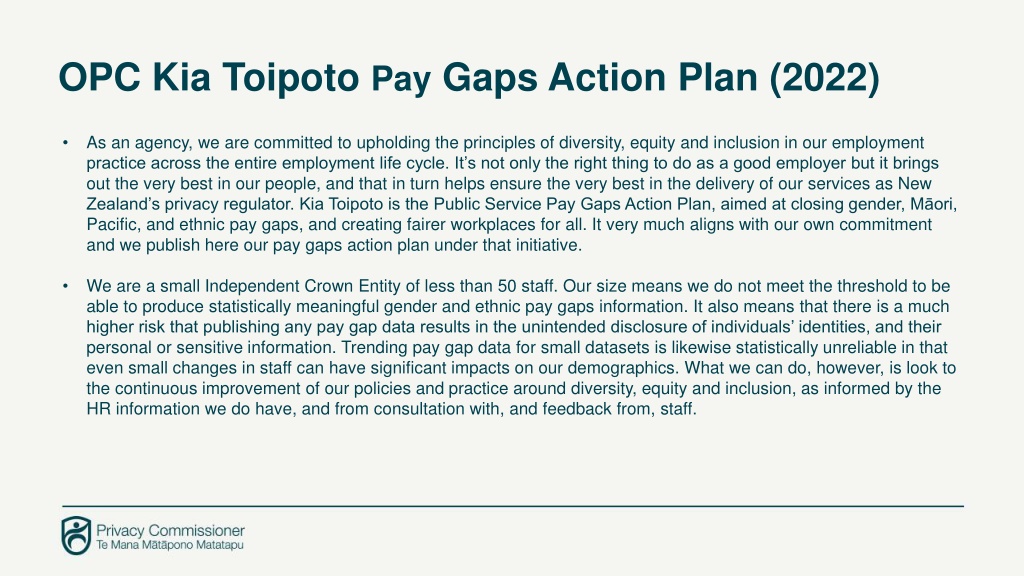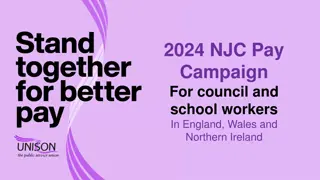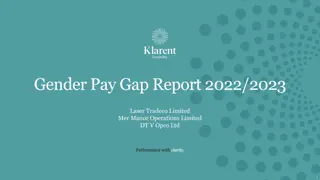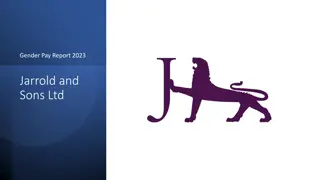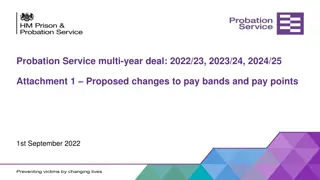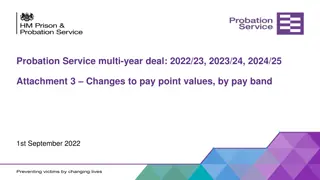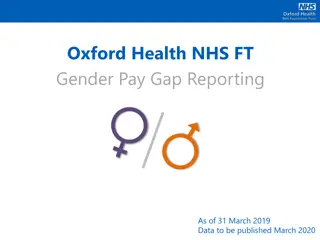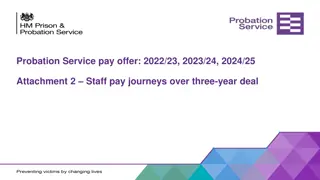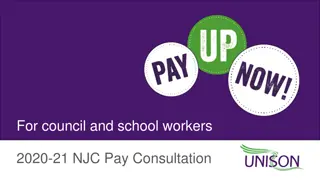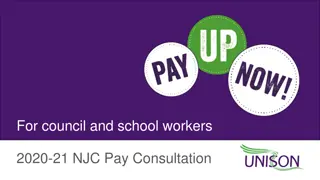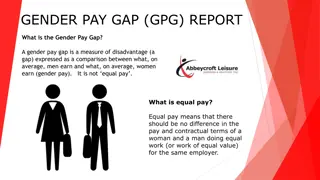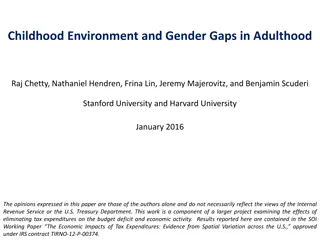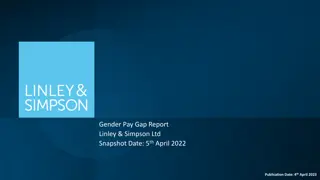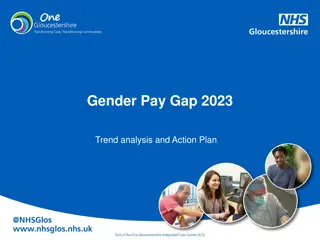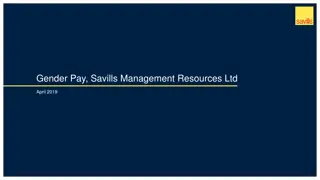OPC Kia Toipoto Pay Gaps Action Plan 2022 Summary
The OPC Kia Toipoto Pay Gaps Action Plan 2022 outlines the agency's commitment to diversity, equity, and inclusion in employment practices. Despite limitations in data due to the small staff size, the agency focuses on continuous improvement in policies informed by HR information and staff feedback. The plan aims to close gender, Māori, Pacific, and ethnic pay gaps, creating fairer workplaces. The agency values a diverse workforce for effective service delivery. Six areas of focus include transparency and equitable pay outcomes. Consultation and collaboration with staff are prioritized for ongoing diversity, equity, and inclusion enhancement.
Download Presentation

Please find below an Image/Link to download the presentation.
The content on the website is provided AS IS for your information and personal use only. It may not be sold, licensed, or shared on other websites without obtaining consent from the author. Download presentation by click this link. If you encounter any issues during the download, it is possible that the publisher has removed the file from their server.
E N D
Presentation Transcript
OPC Kia Toipoto Pay Gaps Action Plan (2022) As an agency, we are committed to upholding the principles of diversity, equity and inclusion in our employment practice across the entire employment life cycle. It s not only the right thing to do as a good employer but it brings out the very best in our people, and that in turn helps ensure the very best in the delivery of our services as New Zealand s privacy regulator. Kia Toipoto is the Public Service Pay Gaps Action Plan, aimed at closing gender, M ori, Pacific, and ethnic pay gaps, and creating fairer workplaces for all. It very much aligns with our own commitment and we publish here our pay gaps action plan under that initiative. We are a small Independent Crown Entity of less than 50 staff. Our size means we do not meet the threshold to be able to produce statistically meaningful gender and ethnic pay gaps information. It also means that there is a much higher risk that publishing any pay gap data results in the unintended disclosure of individuals identities, and their personal or sensitive information. Trending pay gap data for small datasets is likewise statistically unreliable in that even small changes in staff can have significant impacts on our demographics. What we can do, however, is look to the continuous improvement of our policies and practice around diversity, equity and inclusion, as informed by the HR information we do have, and from consultation with, and feedback from, staff.
In summary We work hard to ensure that our employment practices are fair and equitable, and gender and ethnicity neutral, except that wherever possible, we actively seek to increase our diversity where there are gaps in participation. We believe that a diverse workforce helps us to more effectively deliver our services to the diversity in the communities and audiences we serve. We have roles across a range of business functions from strategy and insights, compliance and enforcement, policy, investigations and dispute resolution, communications and engagement, legal, and corporate services. We have a workforce of men, women and gender diverse staff, with the majority across all of our business functions and roles being women (about 80%). At the T2 senior leadership level, we have had either more women than men or an equal number. At the T3 management level, about two-thirds have usually been women. In other words, women are well represented in our senior leadership and management, as they are across all of our other operational roles and pay bands. Whilst we have not to date, for privacy reasons, asked staff to self-identify their ethnicity, we usually have some mix of ethnicities, including those who identify as M ori, Pasifika, Asian and others. Kia Toipoto has 6 areas of focus. We report our progress in each as follows. We plan to actively consult and work with staff across all these areas over the next year with a view to the continuous improvement in our diversity, equity and inclusion policy and practice.
How well embed and/or build on the milestone Kia Toipoto Focus Area How we achieved this milestone All staff have access to our HR policies, including our remuneration, performance management, and professional development policies. Focus area 1: Te Pono Transparency Continue to draw the attention of new staff to our HR policies as part of their induction and onboarding. Update our HR policies as required and ensure that they continue to be easily accessible to all staff. Ensuring easy access to HR and remuneration policies e.g. salary bands Staff also have access to our job bands and the indicative remuneration ranges and competency zones for each. We monitor internal relativity to help ensure that the remuneration for the same or similar roles is fair and equitable, and actively address any gender or ethnic pay gaps if they should arise as a result of remuneration and/or market movements over time. Focus area 2: Ng Hua T kekem te Utu - Equitable pay outcomes Continue to provide all staff an annual remuneration review. Continue to use a total remuneration approach and cross- office moderation by our senior leadership to ensure that remuneration is fair and equitable, and actively address any gender or ethnic pay gaps if they should arise. Ensuring that starting salaries and salaries for the same or similar roles are equitable All remuneration adjustments are cross-moderated by our Senior Leadership Team to help ensure equitable outcomes and internal relativities within teams, across teams, for similar levels of accountability, and across the entire office.
How well embed and/or build on the milestone Kia Toipoto Focus Area How we achieved this milestone We have family friendly and flexible work policies that help promote work/life balance for all staff. These policies equally apply to our senior leadership and wider management and helps us attract and retain a higher diversity at these levels. Focus area 3: Te whai kanohi i nga taumata katoa Leadership and representation Continue to include diversity and inclusion, and embedding Te Ao M ori in our work, as strategic priorities. Continue to participate in the Tupu Tai internship programme, and look for other opportunities to introduce diversity into our workforce. Strengthening gender and ethnic representation We see building diversity in our workforce as being helpful to the more effective delivery of our services to what is a diverse public. Our recruitment policy and practice actively reflect this strategic priority and we use a range of recruitment and marketing channels, including those specifically designed for Te Ao M ori, to target less well represented groups. Our recruitment processes recognise also that candidates with different backgrounds might have different needs and we work hard to ensure that our processes are always respectful, inclusive and accessible. We created a Pou Arahi role at a senior level to help advise our senior leadership and guide our Te Ao M ori journey. We participate in the Tupu Tai Internship programme and this is the second year we have had a Pasifika intern join us in our Policy team.
How well embed and/or build on the milestone Kia Toipoto Focus Area How we achieved this milestone Our professional development policy requires all managers to agree with all staff, full time and part time, their training and development needs and career aspirations, at a minimum at the half-yearly and annual performance reviews. HR actively works with managers to help ensure that these needs are met for all staff through a variety of channels including coaching and mentoring, formal and informal learning courses, and secondment opportunities. Programmes are tailored to suit the individual and encourage participation. Focus area 4: Te Whakawhanaketanga i te Aramahi - Effective career and leadership development Improve how we articulate the competencies and skills required for progression within a role. Continue to actively identify and address with staff their learning and development needs, and ensure that programmes are well targeted and encourage participation. Continue to be as transparent as possible about, and actively invite participation in, career and leadership development opportunities such as for advancement, secondments, cross-functional project leadership, national or international representation or attendance, or participation in cross-office projects, to the extent practicable as and when these opportunities may arise. Ensuring opportunities are transparent and inclusive, and promote participation Progression to a higher level of seniority for a role for example, from Assistant Adviser to Adviser, Senior Adviser or Principal Adviser is against a progression framework of competencies and skills that staff have access to. As with remuneration adjustments, progression is subject to cross- office moderation by our senior leadership team to help ensure that it is inclusive, fair and equitable. Unless exceptional circumstances apply, vacancies are usually internally contestable, if not externally also, and appointment is through our usual robust recruitment processes.
How well embed and/or build on the milestone Kia Toipoto Focus Area How we achieved this milestone We have created a Pou Arahi role at a senior level to help guide our Te Ao Maori journey; develop our strategy and follow up actions for building a greater awareness of tikanga, and our Te Ao Maori and Te Reo capability; and to engage and partner effectively with Maori. Focus area 5: Te whakakore i te katoa ong momo whakatoihara, haukume an hoki - Eliminating all forms of bias and discrimination Continue to promote attendance at Te Reo lessons and reflect Te Ao M ori and other cultural values in the delivery of our services. Continue to provide training in our Te Ao M ori understanding and practice. Consult and engage with staff on the continuous improvement in our diversity, equity and inclusion policy and practice. We welcome new staff with a mihi whakatau, offer Te Reo lessons at beginner and intermediate levels for all staff during business hours, and incorporate Te Reo in our business correspondence and information material. Building an affinity and understanding of Te Ao M ori and other cultural values. We have a cultural competency in all position descriptions and require all staff to demonstrate respect for one another, respect being one of our 5 core values. Discrimination on any grounds is not tolerated. We have a flexible working policy that is principles-based based on the needs of the individual, their role, their team and the office. Flexible working is very much a part of our employment value proposition (EVP). Focus area 6: Te Taunoa o te Mahi P ngore - Flexible-work-by-default Continue to offer flexible working for work/life balance and to attract and retain a more diverse range of staff e.g. those returning to the workforce or those with caregiving responsibilities. Continue to ensure that flexible working does not disadvantage staff in loss of opportunity, relative remuneration, or recognition. Offering flexible work by default Flexible options we have used include, for example, variable start/finish times, flexible hours, remote working, part time vs full time, and compressed hours.
